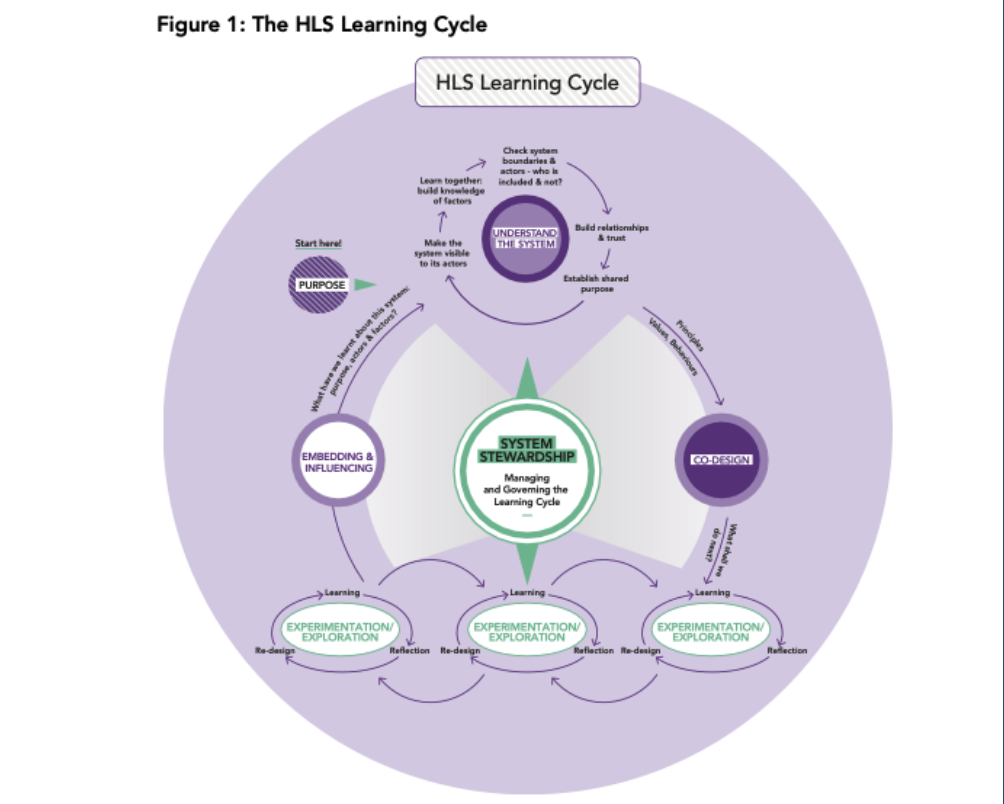A Glimpse of the System
Trust, Relationships… Then Learning
“Emergent strategy is about shifting the way we see and feel the world and each other. If we begin to understand ourselves as a practice ground for transformation, we can transform the world.”
Adrienne Maree Brown, Emergent Strategy, p 191, Human Learning Systems
As in last week’s post, the initial challenge for the Design Lab has been in figuring out how to balance moving at a pace that feels comfortable for the group as well as consciously “slowing down” -- in order to facilitate a space where we can encourage the group to explore at a more fundamental level the complexities involved in establishing themselves as an infrastructure organisation, with a complex and fast moving context around them.
Mapping this complexity has proved a challenge -- as mentioned in what we’ve been up to, we have been working with some of our organisations to produce a “system map”. These maps will help us better understand how those organisations work, how they interact with the contexts around them and where there might be potential barriers which the Lab could provide support for. To better support these emerging organisations we are hoping to understand how deep their roots go.
However, completing this mapping has been tricky; and it feels like we’ve only been able to catch a glimpse of these “ecosystems”. This is due to a variety of challenges obscuring our perspective on how these organisations function -- some of which have overlapped with one another.
There are three main challenges we have encountered during this process:
Finding time to complete this mapping work.
Articulating the purpose and intent of these mapping activities.
Bringing together divergent perspectives within organisations of how these “systems” work.
Human Learning Systems talks about how, at its core, learning is the strategy when it comes to understanding the complex nature of the systems around us in public service settings. It asks us to consider, before being able to make sense of complexity, how we will agree collaborative principles such as “how will we learn together?”; How will we test or experiment together? And how will we make iterative decisions on how to move forward?
This requires more trust and relational working between the actors in that system and anyone who wishes to enter that system -- as it all entails asking potentially uncomfortable questions or potentially showing some vulnerability.
It has been hard to find the right questions, or to find the right time to ask these questions. Some of the Lab participant’s organisations are finding time to engage with this work difficult as they have very pressing concerns which they may feel they are being asked to step away from -- such as feeding people or providing time sensitive support to communities.
When we have been able to catch a glimpse, we have seen examples of well thought out principles and values situated within somewhat haphazard practical structural logistics. We’ve also seen examples of remarkable foresight in intentions and plans to grow these organisations -- the full picture of these organisational ecosystems remains shadowed from us in part however. As we suspect these organisations, due to having to constantly sell their “models” day to day, might not feel ready yet to be able to speak openly in the Design Lab about the “real” challenges, or perhaps do not yet see them. We have learnt that there is always more work to be done, and always an opportunity to renew the trust and relationships we can cultivate beyond signing an agreement to work together to achieve the aims of the Design Lab.
This has been the main reason for planning for a co-designed workshop with the programme group -- starting with agreeing a shared vision and purpose for the Lab will help to establish the trust which will contextualise the reasons we would want to ask about and understand the challenges these organisations face, and subsequently provide the structure and content for the latter part of the programme. Our intention is also to establish a shared purpose for the Lab which will help programme participants feel able to step away from what might feel like pressing business, and feel involved in something that is adding value to the work they do.
Making “Learning” More Explicit
Perhaps, making “learning” as a strategy more explicit in future interactions will help to centre the aims of the Lab and the individual aims of programme participants will help us to find ways to shift our thinking into complexity sooner. Understanding the impacts caused by the introduction of technology into social contexts, and further, thinking about community technology impacts will require us to navigate complexity and ambiguity -- as we don’t have ready made solutions to these challenges, and through the mapping process so far, don’t fully understand what the unique challenges are.
There is insight from our mapping activity to suggest that there are gaps or divergences in some organisations' understanding about some of the solutions or processes they have already put in place. Our ambition to learn more about these challenges before moving to a point where we identify solutions, is both something of importance to the Lab’s objectives and something we seek to instil in the cohort.
Taking the time to learn is of value -- both in the immediate and long term planning for organisations seeking to innovate or provide civil infrastructure. The infrastructure they are or will be providing sits in a complex structure of human relationships and interdependencies.
This week we are also holding a workshop on Accessibility -- this has also stayed with my thinking this week. To provide a structure for the lab going forward, one thing we could do differently is to make our ambitions, challenges and values for the Design Lab much more accessible to the programme participants. Thinking about how to make interactions and content more accessible and providing a sense of clarity as to the intent behind bringing the group together into more reflective sessions and pushing for the group to slow down with us.
Putting Our Thinking Into Action
This week’s “Designing for Accessibility” workshop will be facilitated by an Accessibility Specialist from Scope. It will be an ideal time to check in with the group to propose the theme for a co-designed workshop for the Design Lab more formally and ensure we can give as much clarity as possible as to where we’re going.
From there we can then work towards moving beyond a glimpse of the system and establishing a shared and deeper understanding of how communities can shape digital technologies.
We’ll be reflecting on what comes out of the Accessibility workshop in our next update.
On Accessibility…
Something we shared with the group this week:
Building on our previous workshop focusing on data visualisation I found this useful set of principles for reflecting on how organisations can make data more accessible to audiences with specialised needs by Joel Bethell




